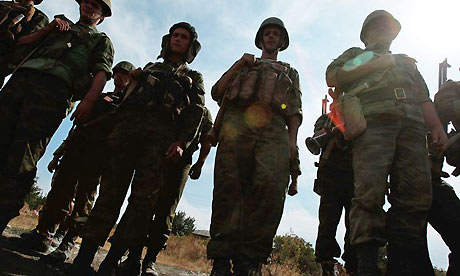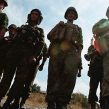
Sochi Meeting Shows Russian Impact on German Foreign Policy
Publication: Eurasia Daily Monitor Volume: 6 Issue: 161
By:

German Chancellor Angela Merkel’s August 14 meeting with Russian President Dmitry Medvedev in Sochi illustrated how this business-centered "strategic partnership" can distort or weaken German foreign policy. In that meeting the Chancellor failed to mention (or perhaps to deem worth mentioning) three major Russian actions with far-reaching effects on European and Eurasian security, which were announced -out of the same place, Sochi- by Russian leaders in the run-up to Merkel’s visit.
On August 10, Medvedev introduced legislative changes to authorize unilateral discretionary deployment of Russian armed forces beyond the country’s borders, in loosely-defined situations including "defense" of foreign countries, of Russian military units stationed abroad, and of Russian "citizens" beyond its borders (EDM, August 14).
Such use of military force is consistent with the "Medvedev Doctrine" as announced in August 2008 (privileged sphere of influence, military protection of Russian "citizens" beyond the border). However, Medvedev’s new initiative has broadened the gamut of pretexts for military operations beyond Russia’s borders.
On August 11, Medvedev released a threatening letter, addressed personally to Ukrainian President Viktor Yushchenko, but in real terms to Ukraine as such. Pegged to the presidential election campaign in that country, and couched in prosecutorial terms, Medvedev’s letter calls for specific changes to Ukraine’s external and internal policies (EDM, August 13).
On August 12, Russian President Vladimir Putin visited Abkhazia -symbolically on the first anniversary of the 2008 Russia-Georgia armistice- to publicly flaunt Russia’s breaches of that armistice. Putin announced a large-scale military build-up in Abkhazia and South Ossetia, in language calculated to challenge and test the European Union as the guarantor of the armistice (Interfax, August 12, 13). The European Union collectively and the United States reacted immediately with statements criticizing Putin’s move, and calling for withdrawal of Russian forces from Georgian territories in accordance with the armistice terms.
In content and in form, those Russian actions are designed to separate Europe’s East normatively from Europe as such. They seek to introduce norms of foreign policy conduct in Russia’s claimed sphere of influence that are clearly different from European norms. Moscow is testing the West’s response to its challenges, emanating at the moment in quick succession from Sochi.
At the Sochi meeting, however, Chancellor Merkel seemed to ignore these momentous challenges to the post-1991 status quo. Nor did she take issue with Russia’s war against Georgia on the war’s first anniversary while in Sochi, just across the border from the scene of ethnic cleansing. Russian leaders may well have concluded that the German government would continue protecting the special Russo-German relationship from the fallout of Russian re-expansionist policies in Europe’s East.
Merkel was meeting with Medvedev for the third time thus far this year; another meeting is planned in the fall. Such frequency of summit-level events (also with Putin during his presidency) is remarkable for German business interests, but has proven irrelevant in terms of affecting Russia’s external conduct. Russia successfully insists on separating the bilateral agenda at these meetings from any candid assessment of Russian foreign-policy behavior. The German coalition government generally goes along with Moscow’s tactic to de-link these issues.
Human rights have a slightly different status in terms of German-Russian summit agendas. The German body politic expects at least a symbolic raising of human rights issues in Russia (if no longer of democracy in Russia) at these meetings. This sentiment is, if anything, more pronounced on the German center-left (for all its strategic naiveté) than on the center-right (with its business-centered version of realpolitik).
In the run-up to the Merkel visit, three representatives of pro-democracy NGO’s were murdered in the North Caucasus (Natalya Estemirova on July 16, Zarema Sadullayeva and Alik Jabrailov on August 11), adding to a long list of unpunished assassinations of human-rights advocates and journalists. International and German pro-democracy NGO’s and even some German Social-Democrat parliamentarians asked Merkel to raise this issue with Medvedev in Sochi (Die Zeit, August 14).
Merkel raised it in this way: "We know that human rights issues are very important to the Russian president. But there should also be deeds. It is very important to do everything to bring to justice those who keep perpetrating horrible murders of NGO’s representatives." Medvedev assured Merkel that Russian authorities would do their best.
Their exchange was consistent with a pattern that recurs from one summit to another and that a German press account described as follows in Sochi: "Medvedev with a serious look on his face would yet again state that this subject is important to him and that he would do something about it. The issue, apparently exhausted for both sides, they then immediately go on to business." In sum, Moscow tolerates a symbolic raising of human rights issues as "a ritual that a German politician cannot avoid" (Die Welt, August 15).
Medvedev and Merkel announced far-reaching plans to expand Russo-German economic relations at this meeting (EDM, August 18). The Sochi meeting showed once again that the economic relationship’s impact on the two sides’ respective policies is deeply asymmetrical. Vested interest in the economic relationship with Russia palpably affects German foreign policy; but, for its part, German is clearly unable to influence Russia’s external conduct.




